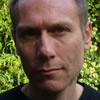Posted on Mar 31, 2014
A special project for 92Y Unterberg Poetry Center’s 75th anniversary, 75 at 75 invites authors to listen to a recording from our archive and write a personal response. Here, Mark Ford writes about a reading by James Schuyler. It was recorded live at 92Y on November 20, 1989.
 James Schuyler gave his first-ever public poetry reading on November 15, 1988, when he was 65. Lines snaked around the block outside the Dia Art Foundation, and many that night were turned away. He was introduced by John Ashbery, his long-time friend and his collaborator on the hilarious novel of manners, A Nest of Ninnies. In his introduction Ashbery confessed to feeling a little “jealous” of his friend’s poetry: “He makes sense, dammit, and he manages to do so without falsifying or simplifying the daunting complexity of life as we are living it today.” Despite his nerves, Schuyler clearly enjoyed the experience, for two days later he wrote to Anne Dunn: “As for my moment in the spotlight—well, truth to tell, I was a fucking sensation.”
James Schuyler gave his first-ever public poetry reading on November 15, 1988, when he was 65. Lines snaked around the block outside the Dia Art Foundation, and many that night were turned away. He was introduced by John Ashbery, his long-time friend and his collaborator on the hilarious novel of manners, A Nest of Ninnies. In his introduction Ashbery confessed to feeling a little “jealous” of his friend’s poetry: “He makes sense, dammit, and he manages to do so without falsifying or simplifying the daunting complexity of life as we are living it today.” Despite his nerves, Schuyler clearly enjoyed the experience, for two days later he wrote to Anne Dunn: “As for my moment in the spotlight—well, truth to tell, I was a fucking sensation.”
Thus began a series of public performances given by Schuyler in a range of venues, from Herman Melville’s farm in Arrowhead, near Pittsfield, to the 92nd Street Y, where he appeared on a double-bill with Ashbery in November of 1989. Stocky, beetle-browed, his voice clear but a little raspy, he delivered in hypnotic, measured tones the poems that had influenced generations of New York-school inspired poets, from Charles North to Peter Gizzi.
A poetry reading by Schuyler was just that—a reading of his poetry. He says nothing, absolutely nothing, at the beginning of his set or between poems. There’s no “I wrote this in the Hamptons” or “I refer in this poem to Bruno Walter, who, as you probably know, was a German-born …” or “The Fairfield mentioned in this poem is the painter Fairfield Porter, with whom …” Nada—though at the end he does offer a valedictory “Thank you.”
His reading opens with “Salute,” the last poem in his first book, Freely Espousing (1969): “Past / is past,” this short, manifesto-like piece concludes; “I salute / that various field.” Nearly all of Schuyler’s poems develop a delicate mediation between his memories and his experience of the present; often those memories revolve around friends, many of whom would have been present in the audience that night. One can’t overestimate the importance of friendship to his life and poetry, and it must have been moving for all those who had helped him through so many difficulties over so many decades to see him appearing in public and receiving rapturous applause both before he opened his mouth and then after he said his gruff “Thank you” and sat down.
One friend who wasn’t there, having died fourteen years earlier, was the painter Fairfield Porter, with whom Jonathan Galassi compares Schuyler’s visual sensibility in his introduction to the reading. Schuyler lived with Porter and his wife Anne for over a decade, and it is fitting that his set ends with “A cardinal,” one of his most exquisite braidings together of past and present: in its oblique, understated way, it’s at once an elegy seamlessly emerging from the processes of everyday life and a hymn to the “various field” of both friendship and nature:
A cardinal
in the branches of the great plane tree whistles its song:
or is it that mimic Fairfield saluting the day
under the branches of his great plane tree in his springtime yard?
Mark Ford’s new collection of poetry is Selected Poems.